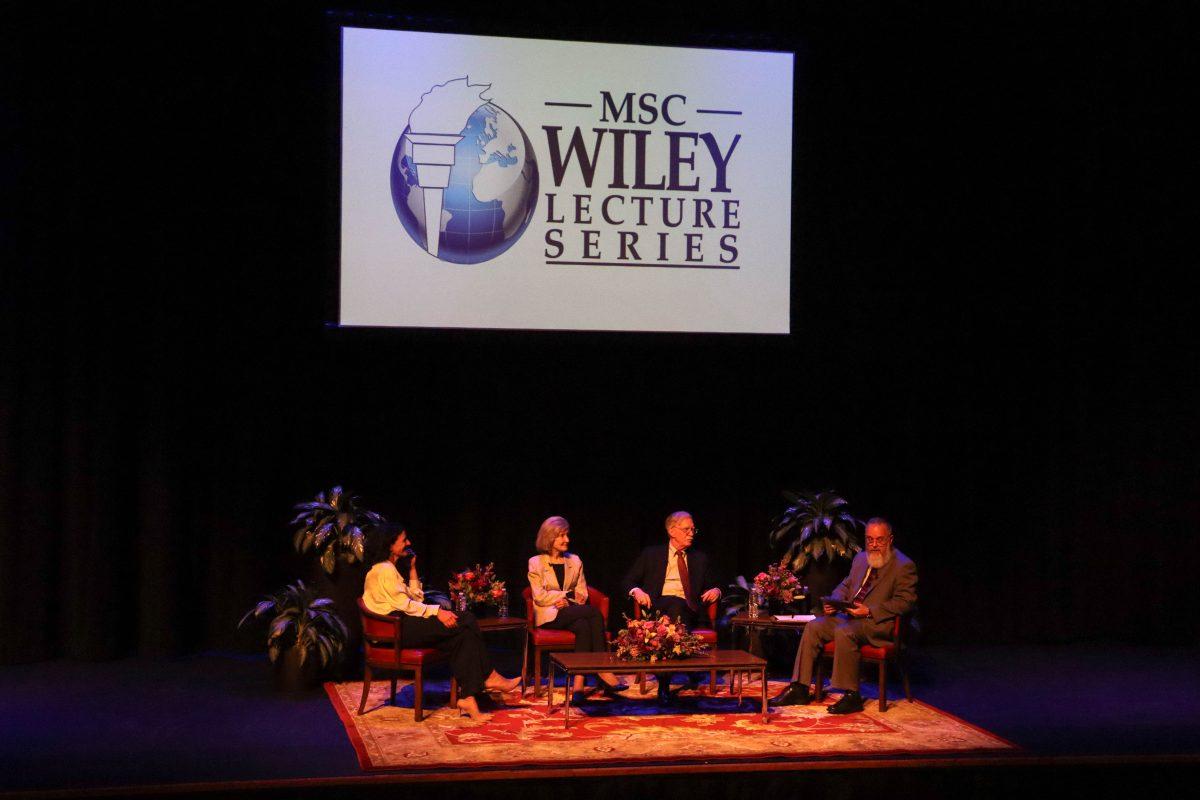Editor’s Note: This article has been updated to correct a date error.
America has become an unstoppable force in doing whatever it takes to pursue its geopolitical and strategic interests.
On Nov. 14, the Memorial Student Center, or MSC, Wiley Lecture Series asked that question to three prominent figures formerly a part of U.S. National security bodies at its ‘Rethinking American Intervention’ program at 7 p.m. in Rudder Theater.
MSC Wiley Lecture Series Chair and political science junior Jackson Grant opened the evening and said this semester marks an important 40th anniversary for the MSC committee. Students, community members and Vice President of Student Affairs Brig. Gen. Joe E. Ramirez attended the evening discussion.
“In 1983, a group of students had the vision to create a committee with the purpose to bring the world to Texas A&M and educate the community on board policy issues,” Grant said. “I’m proud to say that today, our student committee continues that mission to develop and produce timely programs.”
Political science senior lecturer Dwight Roblyer, Ph.D, Class of 1984, served as the program’s moderator. America has given various reasons for intervening in the affairs of sovereign nations throughout its history, Roblyer said.
“Sometimes, we appointed to a threat to our own national security, to the security needs of a regime friendly to us, to our economic national interests or to an ongoing humanitarian harm,” Roblyer said. “Those individual interventions have varied. Varied in the form of economic sanctions, provision of weapons and other forms of aid — military actions and various threats. This discussion will move through America’s history of foreign military interventions over the last half-century and how policy makers have adapted in the ever-changing context of politics.”
Robyler welcomed former U.S. National Security Advisor John Bolton, former U.S. Ambassador to NATO Kay Bailey Hutchison and former Assistant Secretary of the Department of Homeland Security Juliette Kayyem as guests.
Bolton, Hutchison and Kayyem spoke directly to the audience on their former positions and views of American intervention in the last 50 years. Kayyem said the number of Washington’s military interventions increased since the Cold War ended. From 1991 to 2018, there were 200 interventions alone.
“This is a tool of our foreign policy, our economic policy, our national policy and is a tool of our homeland security,” Kayyem said. “So, in any consideration about whether a military intervention is necessary based on whatever criteria one is going to use, it protects our interests.”
Hutchison said intervention extends to communicating interests to other global powers, such as Putin and his assessment of America’s interest in aiding Ukraine.
“[If] Putin, who has been emboldened by thinking that the West is going to lose interest when their interest is not at stake, wins in Ukraine, the next step is going to be [taking] a country that is in NATO,” Hutchison said. “This means that under Article 5 of NATO that our troops would be on the ground in a European war … we know that if he wins in Ukraine that the next step will be more.”
The U.S. will continue supporting Ukraine with arms so that they can win to combat Putin’s attempt to piece together the Soviet Union in the name of Russia, Hutchison said.
“If we let Putin do this and we’ve turned a blind eye in Ukraine, I have absolute commitment that he’ll try the next one and the next one,” Hutchison said. “And with our word on the line, we will have to provide troops on the ground, which I’m not willing to do.”
Bolton brought the conversation back to interests and said interventionism isn’t a philosophy, it’s a mechanism. He said the real issue is defining what American interests are, then figure out how to defend, protect and advance them.
“It may involve military intervention, it may involve intervention of a thousand other different methods, and we’ve seen some of that,” Bolton said. “The main point is that throughout history, America has been an outward-looking country and resists the temptations, whether they come from the right or the left on the political spectrum, simply to turn inward.”
Bolton said a previous U.S intervention particularly important to him was one that recently failed during the Trump Administration, because that is where you learn the most lessons.
“It was our failure to help the opposition in Venezuela overthrow the Maduro regime,” Bolton said. ”Why was this in America’s interest? People of Venezuela were being crushed by the Chavez Maduro dictatorship. Cuba had extended its influence into Venezuela and was propping up the Maduro government. Russia, China and Iran were all heavily involved in Venezuela for their own particular reasons.”
One of those reasons could be that Venezuela has one of the largest stock of Uranium in the ground of any country in the world, Bolton said. The U.S. should have done more to help the opposition, he said.
“We didn’t have much capacity, honestly, to help Venezuela and the opposition,” Bolton said. “We imposed sanctions on Maduro’s regime. We got other countries to take related steps. I frankly don’t think we did enough.”
Bolton said there are distinct interests to be navigated on a geopolitical and strategic scale and to outline the standards in pursuing national security interests. On the other hand, Hutchison said what is most important is implementation.
“I agree with what [Bolton] said,” Hutchison said. “It’s great to say, ‘Here’s the goal,’ but then implementing sometimes is very difficult to do with our standards … it muddies the water. We need to show that when we are in something, we are going to keep our word so that our adversaries and our allies trust us. That’s what my doctrine would be. I want to be what strong, Mr. Ronald Reagan said: ‘Peace through strength.’”
Hutchison said the U.S. has not always followed up on its promise to intervene. An example of this is when Obama said the red line is if Syria attacks its own people, the U.S. will intervene, Hutchison said.
“We didn’t,” Hutchison said. “And that became then something that was used against us later in Iraq. ISIS came back.”
Kayyem said she didn’t want to speak for anyone, but that she agreed with Hutchison’s point. Attendees had the opportunity to submit questions for the panelists via a QR code projected on stage. Robyler then fielded questions asked by the audience before wrapping up the evening.





















